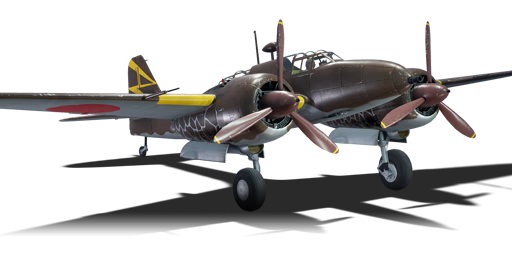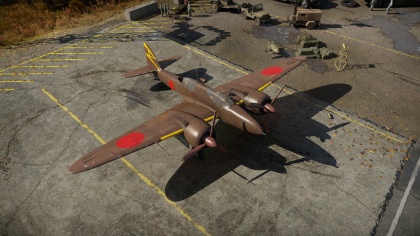Difference between revisions of "Ki-102 otsu"
(→Flight Performance) (Tag: Visual edit) |
(→Flight Performance) |
||
| Line 14: | Line 14: | ||
The {{PAGENAME}} has a decent speed advantage over most enemy planes in a straight line or dive and very good climb rate. The climb rate is typically better than almost every aircraft it will come up to combat against. As with most Japanese heavy fighters, it is a very fast aircraft. The aircraft is as manoeuvrable as you would expect from a heavy fighter, though quite sluggish in a turn compared to a single engine aircraft. The {{PAGENAME}} has good acceleration in a dive due to its two powerful engines and increased weight and decent acceleration when travelling in a straight line. | The {{PAGENAME}} has a decent speed advantage over most enemy planes in a straight line or dive and very good climb rate. The climb rate is typically better than almost every aircraft it will come up to combat against. As with most Japanese heavy fighters, it is a very fast aircraft. The aircraft is as manoeuvrable as you would expect from a heavy fighter, though quite sluggish in a turn compared to a single engine aircraft. The {{PAGENAME}} has good acceleration in a dive due to its two powerful engines and increased weight and decent acceleration when travelling in a straight line. | ||
| − | {| class="wikitable" style="text-align:center" | + | {| class="wikitable" style="text-align:center" width="70%" |
|- | |- | ||
! rowspan="2" |Characteristics | ! rowspan="2" |Characteristics | ||
Revision as of 20:24, 13 September 2020
Contents
Description
The Ki-102 otsu is a rank II Japanese twin-engine fighter
with a battle rating of 3.0 (AB) and 3.3 (RB/SB). It was introduced in Update 1.35.
General info
Flight Performance
The Ki-102 otsu has a decent speed advantage over most enemy planes in a straight line or dive and very good climb rate. The climb rate is typically better than almost every aircraft it will come up to combat against. As with most Japanese heavy fighters, it is a very fast aircraft. The aircraft is as manoeuvrable as you would expect from a heavy fighter, though quite sluggish in a turn compared to a single engine aircraft. The Ki-102 otsu has good acceleration in a dive due to its two powerful engines and increased weight and decent acceleration when travelling in a straight line.
| Characteristics | Max Speed (km/h at 1,900 m) |
Max altitude (meters) |
Turn time (seconds) |
Rate of climb (meters/second) |
Take-off run (meters) | |||
|---|---|---|---|---|---|---|---|---|
| AB | RB | AB | RB | AB | RB | |||
| Stock | 555 | 537 | 10000 | 25.5 | 26.1 | 15.4 | 15.4 | 450 |
| Upgraded | 608 | 580 | 23.6 | 24.5 | 24.9 | 19.5 | ||
Details
| Features | ||||
|---|---|---|---|---|
| Combat flaps | Take-off flaps | Landing flaps | Air brakes | Arrestor gear |
| ✓ | ✓ | ✓ | X | X |
| Limits | ||||
|---|---|---|---|---|
| Wing-break speed (km/h) |
Gear limit (km/h) |
Combat flaps (km/h) |
Max Static G | |
| + | - | |||
| 0 | 310 | 460 | ~9 | ~7 |
| Optimal velocities | |||
|---|---|---|---|
| Ailerons (km/h) |
Rudder (km/h) |
Elevators (km/h) |
Radiator (km/h) |
| < 360 | < 400 | < 400 | > 312 |
| Compressor (RB/SB) | ||
|---|---|---|
| Setting 1 | ||
| Optimal altitude | 100% Engine power | WEP Engine power |
| 2,000 m | 1,350 hp | 1,620 hp |
| Setting 2 | ||
| Optimal altitude | 100% Engine power | WEP Engine power |
| 5,800 m | 1,250 hp | 1,500 hp |
Survivability and armour
Examine the survivability of the aircraft. Note how vulnerable the structure is and how secure the pilot is, whether the fuel tanks are armoured, etc. Describe the armour, if there is any, and also mention the vulnerability of other critical aircraft systems.
Armaments
Offensive armament
The Ki-102 otsu is armed with:
- 1 x 57 mm Ho-401 army cannon, nose-mounted (16 rpg)
- 2 x 20 mm Ho-5 army cannons, chin-mounted (200 rpg = 500 total)
Defensive armament
The Ki-102 otsu is defended by:
- 1 x 12.7 mm Ho-104 army machine gun, dorsal turret (500 rpg)
Usage in battles
Describe the tactics of playing in an aircraft, the features of using vehicles in a team and advice on tactics. Refrain from creating a "guide" - do not impose a single point of view, but instead, give the reader food for thought. Examine the most dangerous enemies and give recommendations on fighting them. If necessary, note the specifics of the game in different modes (AB, RB, SB).
Manual Engine Control
| MEC elements | ||||||
|---|---|---|---|---|---|---|
| Mixer | Pitch | Radiator | Supercharger | Turbocharger | ||
| Oil | Water | Type | ||||
| Controllable | Controllable Auto control available |
Controllable Not auto controlled |
Controllable Not auto controlled |
Separate | Controllable 2 gears |
Not controllable |
Modules
| Tier | Flight performance | Survivability | Weaponry | ||
|---|---|---|---|---|---|
| I | Fuselage repair | Radiator | Offensive 20 mm | Turret 12 mm | |
| II | Compressor | Airframe | New 20 mm cannons | New 12 mm MGs (turret) | |
| III | Wings repair | Engine | New 57 mm cannons | ||
| IV | Engine injection | Cover | |||
Pros and cons
Summarise and briefly evaluate the vehicle in terms of its characteristics and combat effectiveness. Mark its pros and cons in the bulleted list. Try not to use more than 6 points for each of the characteristics. Avoid using categorical definitions such as "bad", "good" and the like - use substitutions with softer forms such as "inadequate" and "effective".
Pros:
Cons:
History
Describe the history of the creation and combat usage of the aircraft in more detail than in the introduction. If the historical reference turns out to be too long, take it to a separate article, taking a link to the article about the vehicle and adding a block "/ History" (example: https://wiki.warthunder.com/(Vehicle-name)/History) and add a link to it here using the main template. Be sure to reference text and sources by using <ref></ref>, as well as adding them at the end of the article with <references />. This section may also include the vehicle's dev blog entry (if applicable) and the in-game encyclopedia description (under === In-game description ===, also if applicable).
Media
Excellent additions to the article would be video guides, screenshots from the game, and photos.
See also
Links to the articles on the War Thunder Wiki that you think will be useful for the reader, for example:
- reference to the series of the aircraft;
- links to approximate analogues of other nations and research trees.
External links
Paste links to sources and external resources, such as:
- topic on the official game forum;
- encyclopedia page on the aircraft;
- other literature.
| Kawasaki Aircraft Industries (川崎航空機工業株式会社) | |
|---|---|
| Biplane Fighters | Ki-10-I · Ki-10-I C · Ki-10-II · Ki-10-II C |
| Fighters | Ki-61-I ko · Ki-61-I otsu · Ki-61-I hei · Tada's Ki-61-I hei · Ki-61-I tei · Ki-61-II Otsu Kai |
| Ki-100 · Ki-100-II | |
| Interceptors | Ki-45 ko · Ki-45 otsu · Ki-45 hei · Ki-45 tei |
| Ki-96 | |
| Ki-102 otsu | |
| Ki-108 Kai | |
| Bombers | Ki-32 |
| Ki-48-II otsu | |
| Captured | ␗Ki-45 hei/tei · ␗Ki-61-I otsu · ▃Ki-61-Ib |
| See also | Kawasaki Shipyard Co. |
| Japan twin-engine fighters and strike aircraft | |
|---|---|
| Navy | |
| Land-based Fighter | |
| J1N | J1N1 |
| J5N | J5N1 |
| Army | |
| Ki-45 | Ki-45 ko · Ki-45 otsu · Ki-45 hei · Ki-45 tei |
| Ki-83 | Ki-83 |
| Ki-96 | Ki-96 |
| Ki-102 | Ki-102 otsu |
| Ki-108 | Ki-108 Kai |
| Ki-109 | Ki-109 |





